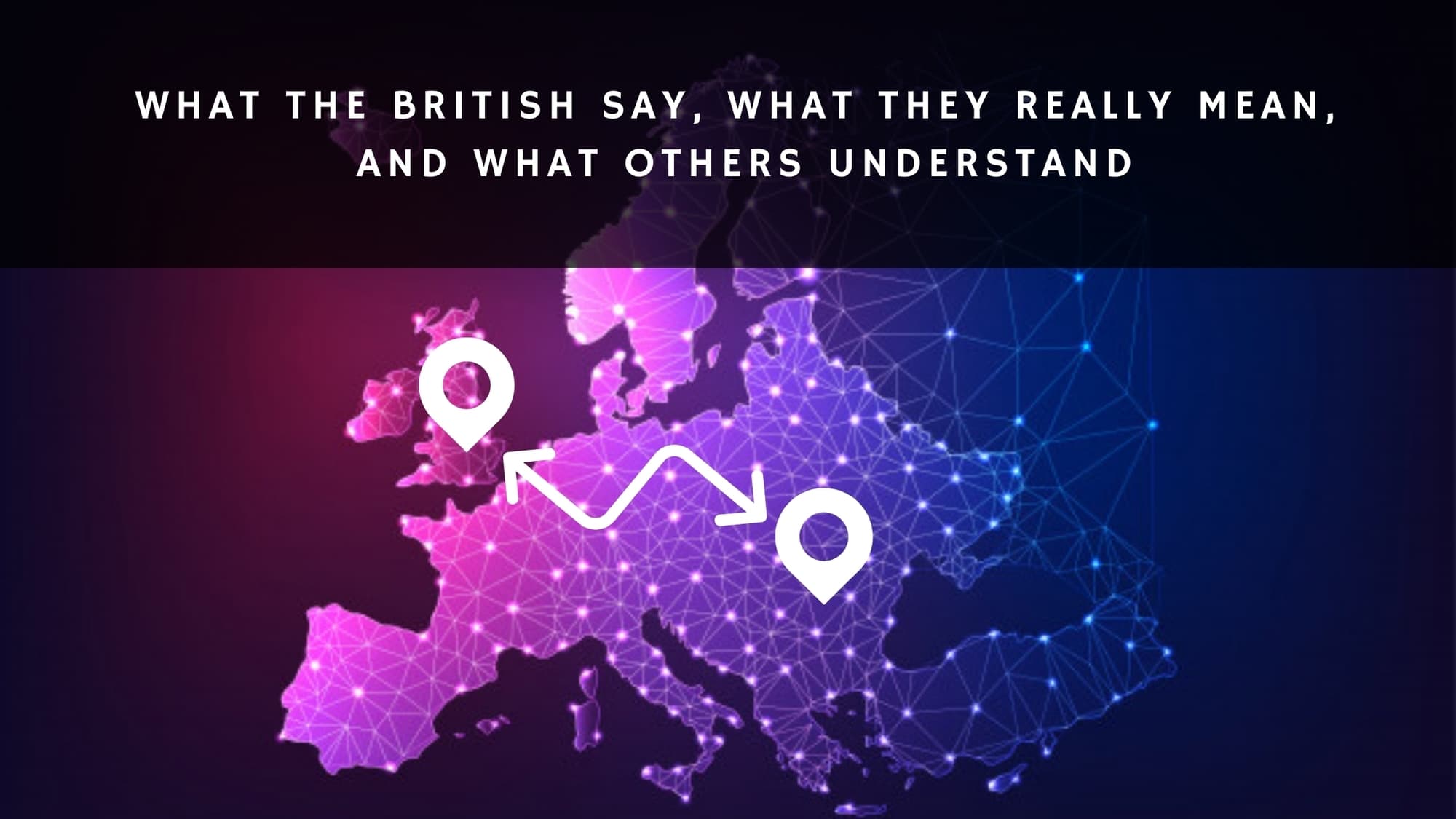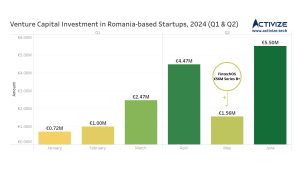Last week we participated in Techmatch’s online webinar “What the British say, what they really mean, and what others understand”, facilitated by Valentin Maior, CEO of TechMatch, and having as guest speaker Bob Spence, International Business Development Consultant.
The session covered selling across the two different cultures of Romania and the United Kingdom within the context of the Geert Hofstede cultural dimensions theory. It provided the participants the basis for a cross-cultural sales model that addresses the six main marketing characteristics: trust, hierarchy, communication, decision-making, time perspective, and persuasion.
First things first let us discuss a bit about the cultural dimensions theory before we dive into the article’s main topic to get a better understanding of what the discussion was about.
Geert Hofstede cultural dimensions theory
Hofstede’s theory is a framework for cross-cultural communication and it shows the effects of a society’s culture on the values of its members, and how these beliefs relate to behavior, using a structure derived from factor analysis.
His theory presents five dimensions, or value perspectives, in which national cultures differ, each of which profoundly affects the business management methods that will succeed with any specific national group. We will just list them here really quickly so you can observe how exactly this theory applies in different cultures, and then we will move on with the topic of the discussion within the session giving the fact that the webinar was wider and covered more areas:

1.Power distance: the degree of inequality between people that a culture considers normal.
2.Individualism vs. collectivism: the cultural belief that the concerns of the individual or the concerns of the group take precedence.
3.Masculinity vs. femininity: the culturally-based preference for achievement or relationship.
4.Uncertainty avoidance: the degree to which a culture is comfortable with ambiguity.
5.Long-term vs. short-term orientation: the culturally-based tendency to value either perseverance, preparation and saving or traditions, present obligations, etc.
Main insights from the session
Why Romania should take into account the UK and care about it?
- The ecosystem in the United Kingdom now is 120% more than it was valued in 2017. The numbers are doubled than the European ecosystem. If you are interested to know more about this exponential growth you can go through all audited figures in this report.
- Every 30 minutes, the UK launches a new business. Every one of those businesses is open to selling to, to partner with, and to collaborate with. And after Brexit, British companies, more than ever before, are much more open-minded about partnering and scaling partnerships.
- The UK overall economy report for 2020 shows substantial growth throughout the pandemic. This indicates that opportunities for UK’s business development will be open across 2021, 2022, and 2023. Subcontracting, partnering, collaborating, selling to, and engaging with the UK market is unlike anything else in Europe giving its fast development.
- We have a lot of things to learn from the UK, in the picture below we will see that there are a few differences between the two countries when it comes to mindset, and the bubble we are in should be burst so it can open doors to new business opportunities.
What does that mean for sales communication and development?
Well, a lot of things that should be taken into account, for example how we prepare for our presentation. Do we have a presentation? How much do we talk? What do we know about the person or the company we are meeting with? What is expected of us to talk about and more? Adaptability is the key.
Bob Spence stated that during a series of meetings, the UK company might act as though it has a very flat organizational structure. While it is not a rigid structure, it has the appearance of one. It’s not really clear when the organizational hierarchy is active and when it’s inactive. This type of behavior is common during sessions, and it can lead to misunderstandings over who is making the important decisions.
We should note this down since we might have gotten used to a different pattern. Knowing this can help us understand better the client’s needs and we won’t be stuck in our own approach, and do things differently. We can think of anecdotes, of what questions we might be asked during these types of sessions, and how to not sound evasive and like we do not know what we are talking about.
This gif would explain best if a person in a meeting doesn’t know what is talking about:

Also, we should spend more time learning about how the UK prospect is inclined to make a decision. Rather than perfecting how we articulate our proposition, we should spend more time studying the experience of the person we are meeting with. We can learn about the company’s financial success, and we can study the company’s culture by visiting the company’s website.
Be adaptable with the given information and have a different approach than the one you are used with. Read more about the cultural differences that we mentioned above in the article and how these are applied in companies from the UK.
We also need to make sure that there’s a follow-up done in a few days so the information is not forgotten. Herman Ebbinghaus theorized the forgetting curve which explains the decline of memory retention in time, and if the information given during a meeting is broad and details need to be remembered then a follow-up will help both counterparts remember the discussions there. After all, a friendly reminder of what has been said never hurts anybody.

To embrace better what we stated above, here is the picture that presents the five dimensions, or value perspectives, in which national cultures differ, each of which profoundly affects the business management methods that will succeed with any specific national group taking into account the UK and Romania. Look at it for a bit? What differences can you see? What are the main conclusions you can draw from this?
In the picture above you can see that the biggest difference between the UK and Romania is individualism. This concept explains really well how success is measured in each country, and how is seen.
A person who is motivated by personal achievements and goals whether someone who works well in a collectivist culture searches for the success of the group. What does that say about the UK? What does that say about Romania?
Why does this matter after all?
Because we can deepen our knowledge and understanding of what is happening in the UK, and what approach we should take when having a business meeting or a project there.
If we don’t know where to begin, we should first look at and grasp what the culture there is like. We would be happier if foreign people would understand better how we think and do things here so we should do the same.
Logistics can shape a meeting too
Another important matter is to not forget about the logistics now that meetings are held online. As a salesperson, you might not have the same charisma that you had when these took place face to face, but there are other tools you can use to keep a discussion engaged. Your webcam can be used to your advantage, it brings you closer to the person you are talking with.
They can put a face to the voice, and they can read a bit of your body language which is important in a meeting. Try to exercise how you talk in front of the camera, how you get your ideas across, and how much attention you give to your gestures, you might not want to scratch the back of your head as if you are not knowing something but instead use your hands to point out and create a visual for the other person.
And remember to always have your camera open. A closed camera can show that you are not that interested and that you might be doing something else in the meantime. Humans make connections, and with today’s external context the only way you can see the human you are having the meeting with is through the webcam of their laptop.
Conclusion
The webinar was just the beginning of a 3 set of webinars and articles that will deepen these concepts, and how they are applied in business development. See about the following events on Techmatch’s webpage: https://www.facebook.com/techmatcheu/events
Overall, everybody is aware that cultural differences and approaches exist but maybe many of us didn’t look into them thoroughly and with this webinar, we caught a starting point into what this means and how we can use it to our advantage to grow and develop the startups we have.
If you want to discover more information on this topic we recommend the following materials for learning:
- The article written by Bob Spence on the TechMatch blog.
- A podcast with Bob Spence and Kasia Lanucha, Associate Intercultural Trainer and Coach at TCO International, on cross-cultural sales.
- A video on humor and culture from Chris Smit, Intercultural management specialist, and international business expert.
- Geert Hofstede’s research here.






